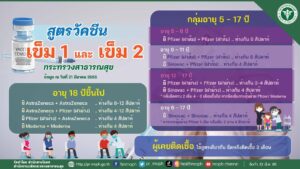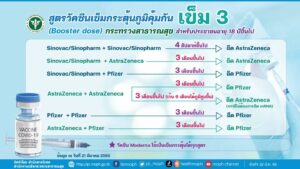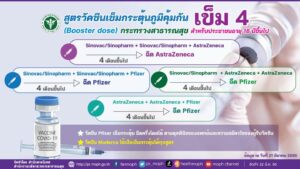FAQs
Popular questions related to the COVID-19 vaccination.
-
1.Is this website a systematic review?
*These summaries are not a systematic review. Each summary is provided by Covid Vaccines Thailand team comprised of a few clinicians and researchers intending mainly to support general population in Thailand with accessible platform to directly educate themselves or follow COVID-19 vaccines research knowledge from the original source of information with no marketing purposes. The summaries might not be in the exactly same format. Different persons summarize them under quality control. Please do not copy or edit this information to mislead the summaries with other intentions.
If you were to have any questions, suggestions, spot any mistakes, need further support or would like to join our team please contact us at covidvacth@gmail.com. We would appreciate it 😀
Remark: According to the number of vaccination from the Department of Disease Control has been changed from per daily to per week, so CovidVacTH.com showed the number of vaccination per week as well.
Best regards,
Covid Vaccines Thailand TeamAnswered by : Covid Vaccines Thailand Team -
2.Vaccination Policy in Thailand
Following the advice of the Advisory Committee on Immunization Practice, approved by the National Infectious Diseases Committee and COVID-19 Emergency Operation Center (Updated 21 March 2022)
- 1st and 2nd doses vaccination
Source: https://web.facebook.com/photo/?fbid=282954973983500&set=a.249595710652760
- 3rd dose vaccination (Booster dose)
Source: https://web.facebook.com/permalink.php?story_fbid=283015277310803&id=100068069971811
- 4th dose vaccination (Booster dose)
Source: https://web.facebook.com/permalink.php?story_fbid=283069113972086&id=100068069971811
Answered by : Covid Vaccines Thailand Team -
3.General information about the COVID-19 vaccination
- COVID-19 vaccination among individuals
Answer: The government has a policy for all citizens living in Thailand, both Thai and foreigners, to receive the COVID-19 vaccine thoroughly. We aim to cover 70 percent of the population by 2021. However, the first group of vaccine roll-out will be for people at high risk of infection or prone to severe diseases, including:- Front-line healthcare workers, both public and private sectors
- People with chronic diseases such as chronic respiratory diseases, cardiovascular diseases, chronic kidney diseases (stage 5), stroke, diabetes, all types of cancer undergoing chemotherapy, radiotherapy and immunotherapy, HIV infected person, psychiatric patients, autism, and those who are unable to care for themselves, including their caregivers
- People aged 60 years and over
- Officials involved in the control of COVID-19, such as village health volunteers and foreign citizens health volunteer
- The military and police are required to screen people entering from abroad and in areas with outbreaks
- People who live in areas that are experiencing outbreaks
- COVID-19 Vaccine in Thailand
- The COVID-19 Vaccine AstraZeneca is a live attenuated vaccine. It is given to people aged 18 years and over who must receive a total of 2 vaccines 10-12 weeks apart.
- CoronaVac or Sinovac COVID-19 vaccine is a killed vaccine. which is currently prescribed for people aged 18 – 59 years who must receive a total of 2 vaccinations 2-4 weeks apart.
- Side effects caused by vaccination, what are the side effects after the covid 19 vaccination?
Answer: According to studies, each type of COVID-19 vaccine is often seen as a local reaction, such as pain, swelling, redness at the injection site. Most of them have mild symptoms and can go away on their own without medication. However, although these vaccines have been approved by the Food and Drug Administration (FDA) as safe and available for use. But these vaccinations can still cause severe allergic reactions at different rates. It is imperative that symptoms be observed after at least 30 minutes in a healthcare setting or vaccination site, and since the COVID-19 vaccine is new and no long-term follow-up data is available. If the recipient has an adverse reaction or is unsure whether it is caused by the vaccine or not, vaccinators should consult to a doctor, especially if there are severe adverse reactions and occurred 4 weeks after vaccination (adverse event following immunization). - Contraindications and precautions for COVID-19 vaccination
Answer: All vaccines have prohibitions. Allergy to any component of the vaccine, and because these vaccines are new, there may be no knowledge of these uncommon allergic reactions. These vaccines should be initially administered in a medical facility or facility that can provide support for severe reactions and should watch for symptoms after the injection for at least 30 minutes. Vaccination should only be given to the population as recommended by the Ministry of Public Health. In addition, the vaccine should not be vaccinated in the following cases:- while being sick or the body is exhausted from various reasons, the injection should be postponed until it is normal.
– in the unaccredited age group
– in the first trimester of pregnancy (but can be injected in women after giving birth or breastfeeding)
– people with severe congenital disease that may be life-threatening with unstable symptoms, recurrent disease, unless a regular physician assesses whether the injection can be administered - Guidelines for the behavior of those who receive the vaccine for COVID-19
- What is the preparation before getting the COVID-19 vaccine?
Answer: Act normally, get enough rest, take your medication as usual, make your mind not stressed or anxious, if sick, the injection should be postponed. - Is it necessary to drink a lot of water before vaccination?
Answer: No - Before vaccination, is it necessary to refrain from drinking tea, coffee, alcohol or not exercising?
Answer: It is not necessary to refrain from tea and coffee but should refrain from drunken beverages. The exercise can be done normally. - Whoever receives the COVID-19 vaccine after vaccination, can they take medicine to reduce fever and relieve pain?
Answer: It can be taken. The safest antipyretic drug is paracetamol within the prescribed dosage.
- What is the preparation before getting the COVID-19 vaccine?
Answered by : Department of disease control
View more - COVID-19 vaccination among individuals
-
4.For those who have had a history of COVID-19 in the past, do they still need to get the Covid-19 vaccine?
For those who have had a history of COVID-19 in the past, even if they are immune to the COVID-19 virus in their body, there is still a chance of re-infection. Therefore, they should always be vaccinated, even if they have had COVID-19 in the past, at least 3 months apart from infection There is no need to test for infection before vaccination because it cannot induce any harm from vaccination. It may be considered to inject only 1 dose because it can stimulate the immune system sufficiently.
Answered by : Department of disease control
View more -
5.Can other vaccines such as the flu vaccine, rabies vaccine, diphtheria-tetanus vaccine, measles rubella vaccine be given simultaneously with the COVID-19 vaccine? If not, what is the appropriate duration?
The COVID-19 vaccine is a vaccine that has only been released for a short time and there is no information about giving this vaccine along with other vaccines. It is therefore advisable to have at least two weeks between the COVID-19 vaccine and other vaccines to avoid possible simultaneous vaccination reactions and the response interference to subsequent vaccines. The priority should be given to vaccination against COVID-19 before other vaccines. However, necessary vaccines such as rabies vaccines when bitten by an animal or tetanus vaccines when there is a wound should be given right away without having to pause a period. In cases where there is a high risk of contracting COVID-19, get vaccinated as soon as possible, regardless of a period to reduce the risk of severe diseases that must be considered more.
Answered by : Department of disease control
View more -
6.For those who have been vaccinated against COVID-19, do they still need to be vaccinated again like the flu vaccination?
There are currently no study data on the effect of the COVID-19 vaccine on long-term immunity. Therefore, there are currently no recommendations.
Answered by : Department of disease control
View more -
7.Can the vaccination protect against the mutated viruses?
Vaccines that are currently produced are developed from a virus that was initially epidemic. Therefore, this may cause the reduction in efficiency against mutant viruses. However, the effect of the mutant viruses on the effectiveness of each vaccine requires further study. It is possible that vaccinations against the mutated virus will be needed in the future.
Answered by : Department of disease control
View more -
8.Will the vaccination make the disease less severe?
Vaccinations may not prevent all infections, but it can prevent most severe symptoms of the disease. Therefore, those who have been vaccinated may become asymptomatic or have very few symptoms. So, after vaccination, it is necessary to maintain measures to prevent infection in the community, such as wearing a mask, keeping physical distance, avoiding going to crowded places and continuing to wash your hands frequently. Until there is certainty that most or almost all the people in the community have immunity to the disease, the measures cannot be reduced. The Ministry of Public Health will continue to advise.
Answered by : Department of disease control
View more -
9.Frequently Asked Questions for Women
- Can menstruating women get the COVID-19 vaccine?
Answer: Menstruation is not a contraindication for vaccinating against COVID-19. - Can pregnant women get vaccinated against COVID-19?
Answer: Pregnant women can get any types of COVID-19 vaccine, if the gestation period is more than 12 weeks onwards. - After vaccination, is contraception required? And how long after that can women get pregnant?
Answer: Contraception is not required, women can pregnant after covid 19 vaccination. - For those who are vaccinated and find out that they are pregnant, what will they do?
Answer: It is not necessary to terminate the pregnancy when found to be pregnant after vaccination, because studies have shown that the vaccine is not harmful to an unborn baby or pregnancy. A second dose of COVID-19 vaccine should be given after 12 weeks of gestation. - Can breastfeeding women be vaccinated against COVID-19?
Answer: Breastfeeding women can get any types of COVID-19 vaccine. There is no need to stop breastfeeding after vaccination.
Answered by : Department of disease control
View more - Can menstruating women get the COVID-19 vaccine?
-
10.What is the longest time between the 1st and 2nd doses of the COVID-19 vaccine? If those who receive the 2nd vaccination more than 4 weeks apart from the 1st dose, what should be done?
The interval between the 1st and 2nd doses of Sinovac’s COVID-19 vaccine is 2-4 weeks. For the AstraZeneca vaccine, the interval is 10-12 weeks, and up to 16 weeks if necessary. If those who are delayed receiving the vaccine, they should ask the staff to follow up to receive the 2nd Covid-19 vaccine as soon as possible. There is no need to restart the injection.
Answered by : Department of disease control
View more -
11.If those who is the recipient of the Sinovac 1st vaccine has numbness in the limb or weakness on the side of vaccination, can they get the Sinovac vaccine for the second dose?
Numbness, weakness, or other nervous system-like symptoms that are temporary without any pathologies and are recovered are not a contraindication to the second dose of the same vaccine. If the symptoms are severe and worrying, the type of vaccine should be changed in the second dose.
Answered by : Department of disease control
View more -
12.If those who receive AstraZeneca vaccine have an allergic reaction with the age over 60, can they receive Sinovac or not and how far should they receive?
The Sinovac vaccine can be given instead at the interval of 10-16 weeks (depending on the distance between AstraZeneca Vaccine 1st and 2nd). The gap between the 2nd dose and the 1st dose in case of changing the type of vaccine should be based on the type of vaccine administered as the 1st dose.
Answered by : Department of disease control
View more -
13.If those who have been vaccinated against COVID-19 but later find out that they have received another type of vaccine in the past 14 days, what should they do?
No revaccination or treatment is required but watch for the symptoms and counting the vaccination continuously.
Answered by : Department of disease control
View more -
14.For those who are patients with high blood pressure, on medication and have stable symptoms who get dizziness, nausea, high blood pressure, and a slight numbness in the right side of the face after vaccination, can they receive a second dose of COVID-19 vaccine?
The second dose should be given, but the type of vaccine should be changed if there is a severe reaction in the first dose.
Answered by : Department of disease control
View more -
15.For those who have had a history of COVID-19 in the past, do they still need to get the COVID-19 vaccine?
For those who have had a history of COVID-19, even if they have immunity to COVID-19 in their body, there is currently no information on how long the immune system will last to prevent infection with the COVID-19 for next time. There is still have a chance of re-infection. Therefore, they should always be vaccinated against COVID-19, even if they have had COVID-19 in the past, at least 3-6 months apart from infection. There is no need to test for infection before vaccination because it cannot induce any harm from vaccination. It may be considered to inject only 1 dose because it can stimulate the immune system sufficiently.
Answered by : Department of disease control
View more -
16.For those who have problems with the “Mor Prom” application, who can they call?
If they have any questions about the use of “Mor Prom”, they can contact the Mor Prom Contact Center at 0-2792-2333.
Answered by : Department of disease control
View more


